Ashu T Art Director Off the Block the Chi
OP Sequence
OP: 「オープニングテーマ「坂道のメロディ」 (Sakamichi no Melody) by YUKI
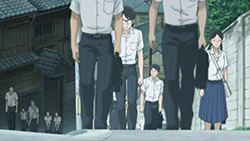 |  | 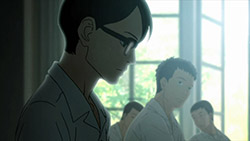 |
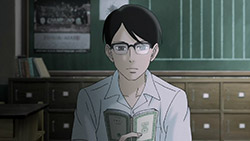 | 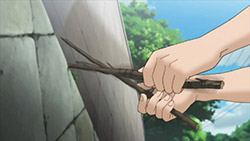 | 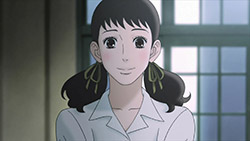 |
 |  | 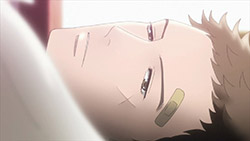 |
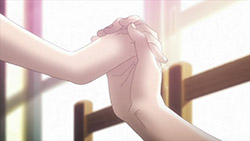 |  | 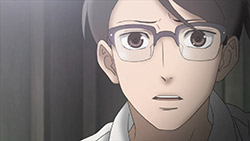 |
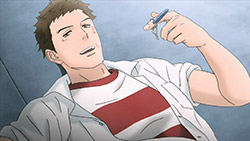 | 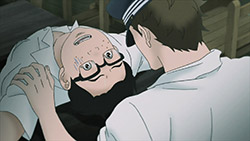 |  |
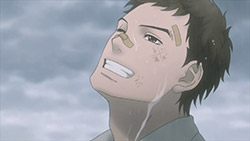 | 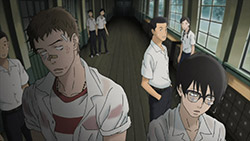 | 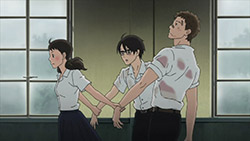 |
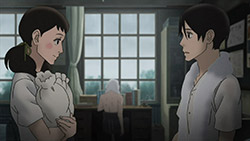 | 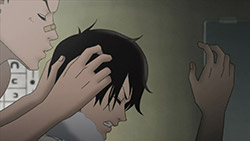 |  |
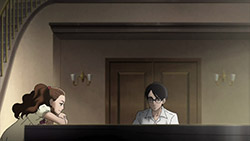 | 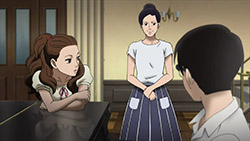 | 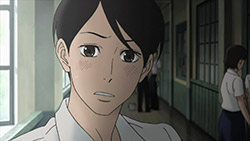 |
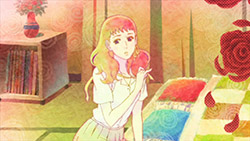 | 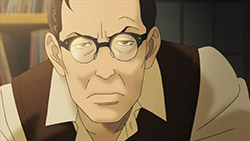 | 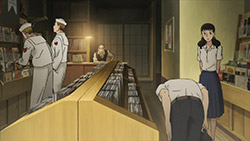 |
 | 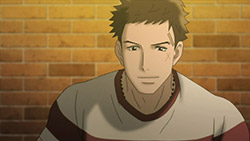 | 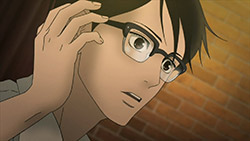 |
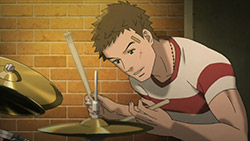 | 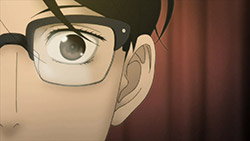 | 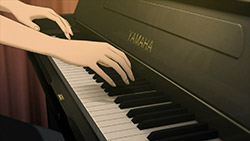 |
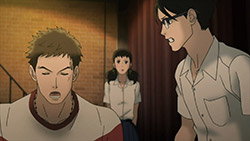 | 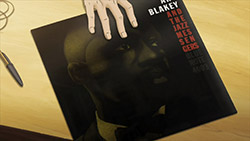 | 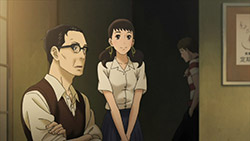 |
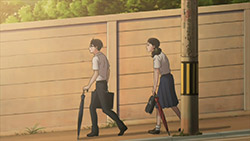 | 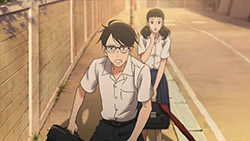 | 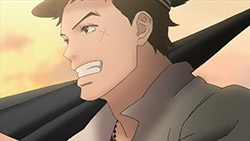 |
「モーニン」
"Moanin'"
How can a show with such ridiculously high expectations possibly exceed them?
What was without question the most anticipated mean solar day of premières this season kicks off with Sakamichi no Apollon, the long-awaited render of legendary director Watanabe Shinichiro (of Cowboy Bebop fame). I'll become the suspense out of the way quickly – yep, it's great. This has already been a very strong season, though I'm non ready to telephone call it peachy merely yet based on (though it'due south inappreciably easy to say and so early on) the small number of serial that seem to have the potential to be classics. Well, here's 1 that does – and it represents (along with Tsuritama, hopefully) a return to greatness for the NoitaminA cake.
This is definitely a NoitaminA serial. It's thoughtful, subtle and graphic symbol-driven, lacking in any of the transitory qualities that tend to make a series a hitting. Sakamichi could have aired in 1992 or 2002 – information technology just happens to be airing in 2012, which perchance gives its addicted but slightly contemptuous await back at the 1960's a little more resonance. Given the pedigree here – non just Watanabe simply music past the great Kanno Yoko (who also plays piano on the soundtrack) – you lot knew music would be a central theme and spectacular, and it is. Watanabe himself has been music director on a number of series and he and Kanno-san have partnered with spectacular results. I'grand of the view that Cowboy Bebop – while excellent – is slightly overrated every bit a whole, but generally considering Watanabe-sensei was working with a adequately routine premise – management and music were off the charts. Here, he has a critically-acclaimed manga to work with – albeit i that will have to be trimmed considerably to fit into 12 episodes.
Young Nishimi Kaoru (a bright Kimura Ryouhei) is a navy brat – a nerdy-looking kid with glasses who's bounced around from school to school considering of his begetter's naval career, and whose mother has apparently abandoned the male child and his father. His latest move lands him in an unnamed boondocks in Kyushu, the southernmost of Japan'southward four main islands. Kaoru is used to bad-mannered kickoff days – the cold stares, the dismissals, the loneliness. The only i to talk to him right abroad is Maruo Shigetora (Murasae Ayumu, debut operation)) a social outcast himself. Mauro warns Kaoru about the bully who sits behind him, a boy to be avoided and placated at all cost. The class president Mukae Ritsuko (Nanri Yuuka, Saori from Hourou Musuko) offers to show Kaoru around the school and he's immediately smitten with her, but when the bullying begins the walls showtime to close in on him – and a peculiarity of Kaoru is that whenever he feels this sort of thing happening (which is apparently oftentimes) the only way he tin cure his nausea and panic is to flee to the roof.
All of that being prologue, this is where the story really begins, as Kaoru finds Kawabuchi Sentarou (Hosoya Yoshimasa, playing against type) sleeping under a tarp outside the locked roof. Sentarou is the bully Maruo warned Kaoru near, and fights 3 seniors for the primal – and whups them – only to offer to sell it to Kaoru for 100,000 yen (which is about $1200, a ton for a high-schoolhouse educatee now, never mind in 1966). This is unquestionably the key relationship in the story, and in many ways Kaoru and Sentarou stand for the cultural dissever that was kickoff to crystalize then. Sentarou and Kaoru are opposites in every way – the i huge and muscular, the other wispy and academic. Sentarou is a free spirit, Kaoru nevertheless locked inside himself – equally Watanbe (and mangaka Kodama Yuki, presumably) demonstrate beautifully with a scene where Sentarou casts aside his umbrella and exuberantly allows the rain to wash over him as Kaoru watches, astonished.
People are naturally going to speculate on the nature of this relationship – they already have, in fact – which begins with Sentarou reaching out and grabbing Kaoru'southward hand as he wakes up. With such reflexive suspicion amid many anime fans for anything remotely resembling a sensitive relationship between males, a hue and cry of "Yaoi!" has already been raised here. I don't see information technology myself, as Kaoru for certain (and probably Sentarou as well) seems to have a beat out on Ritsuko. It looks more like bromance to me but bluntly, I don't intendance – with writing this good, any human relationship is interesting and this 1 is no exception. Sentarou and Kaoru do appear to have one major involvement in common – music. Simply fifty-fifty here we see the cultural divide in play – Kaoru is studying classical piano, and Sentarou's globe is focused on jazz, and nothing just (he's a drummer, and a good one).
I was pretty astonished by the scene in the basement of Welcome Records, the music shop Ritsuko'southward father owns and above which the family lives. The basement is a studio, and there Kaoru sees Sentarou bear witness off his talents on the drums (a beautifully animated scene) – again, in astonishment. It seems that being in Sentarou'southward presence lifts the weight from Kaoru'south breast and takes abroad his panic – and it seems to me that it's basking in the glow of Sentarou's freedom that has this outcome. Given that Kaoru'due south habitation life is apparently no bargain either – he'south living with a seemingly wealthy Aunt who seems to hold him in low regard and a bratty cousin (we see the 2nd memorable NoitaminA usage of Debussy's "Claire de Lune" in a twelvemonth every bit Kaoru plays it at their big house) it'southward only in Sentarou and Ritsuko's visitor that Kaoru seems to escape that pressure ever keeping him on the border of panic (Watanabe portrays this beautifully by showing Kaoru "swinging" down the slope as Sentarou's drums play in his head). Ritsuko tries to button her onetime friend and new together, simply when Kaoru haltingly simply correctly taps out the into to Art Blakey & The Jazz Messengers' "Moanin'" on the studio pianoforte, Sentarou derides him for playing it with no swing whatsoever. Kaoru promptly buys Blakey's recording (the Blue Notation 4003 version) and determines to learn to play the vocal well enough to shut Sentarou up.
I won't speak for you, just I absolutely can't wait to hear Sentarou and Kaoru jam together on "Moanin'" – and I doubtable Ritsuko's Dad will be a part of that, likewise. The beloved of music is infectious here, and intertwined perfectly with the elemental feelings of teenage isolation and the commencement pangs of romantic dearest. This seems to be a very unproblematic story near very bones human being experiences, just it's in the telling that the magic comes – the youthful and bright OP past YUKI and gorgeous piano & strings ED by Motohiro Hata, the detailed and lovely backgrounds, the accurate dialogue, the way Kaoru's sense of isolation, fear and finally astonished excitement experience and so personal and real. I oasis't seen school scenes this skilful since Hourou Musuko, which like Sakamichi brilliantly captured those emotions we feel in that peculiar environment and put us inside the minds and hearts of the characters. What comes through here is artistry, and love of the subject on the role of the creators – a love for music, and a love for anime. If NoitaminA is about brining us anime every bit art, so Sakamichi no Apollon truly does represent a triumphant return to form.
ED Sequence
ED: 「エンディングテーマ「アルタイル」 (Altair) by Motohiro Hata
Source: https://randomc.net/2012/04/12/sakamichi-no-apollon-01/
0 Response to "Ashu T Art Director Off the Block the Chi"
Post a Comment